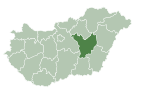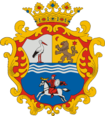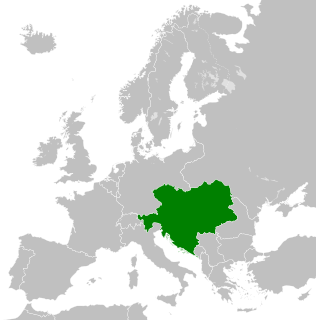
Austria-Hungary, often referred to as the Austro-Hungarian Empire or the Dual Monarchy, was a constitutional monarchy and great power in Central Europe between 1867 and 1918. It was formed with the Austro-Hungarian Compromise of 1867 in the aftermath of the Austro-Prussian War and was dissolved shortly after its defeat in the First World War.

Hungary is a landlocked country in Central Europe. Spanning 93,030 square kilometres (35,920 sq mi) of the Carpathian Basin, it is bordered by Slovakia to the north, Ukraine to the northeast, Romania to the east and southeast, Serbia to the south, Croatia and Slovenia to the southwest, and Austria to the west. Hungary has a population of nearly 10 million, mostly ethnic Hungarians and a significant Romani minority. Hungarian, the official language, is the world's most widely spoken Uralic language and among the few non-Indo-European languages widely spoken in Europe. Budapest is the country's capital and largest city; other major urban areas include Debrecen, Szeged, Miskolc, Pécs, and Győr.
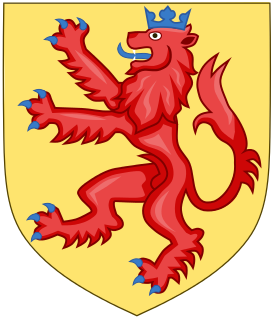
The House of Habsburg, alternatively spelled Hapsburg in English and also known as the House of Austria is one of the most prominent dynasties in European history.

Hungarian is a Uralic language spoken in Hungary and parts of several neighbouring countries. It is the official language of Hungary and one of the 24 official languages of the European Union. Outside Hungary, it is also spoken by communities of Hungarians in southern Slovakia, western Ukraine (Subcarpathia), central and western Romania (Transylvania), northern Serbia (Vojvodina), northern Croatia, northeastern Slovenia (Prekmurje), and eastern Austria.
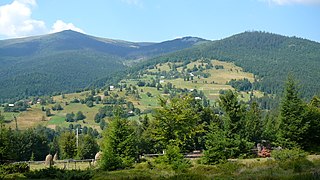
Transylvania is a historical region in central Romania. To the east and south its natural border is the Carpathian Mountains, and to the west the Apuseni Mountains. Broader definitions of Transylvania also encompass the western and north-western Romanian regions Crișana and Maramureș and occasionally Banat.

Budapest is the capital and most populous city of Hungary. It is the ninth-largest city in the European Union by population within city limits and the second-largest city on Danube river; the city has an estimated population of 1,752,286 over a land area of about 525 square kilometres. Budapest, which is both a city and county, forms the centre of the Budapest metropolitan area, which has an area of 7,626 square kilometres and a population of 3,303,786, comprising 33% of the population of Hungary.

Franz Joseph I or Francis Joseph I was Emperor of Austria, King of Hungary, and the other states of the Austro-Hungarian Empire from 2 December 1848 until his death. From 1 May 1850 to 24 August 1866 he was also President of the German Confederation. He was the longest-reigning ruler of the Austro-Hungarian Empire, as well as the longest-reigning emperor and seventh-longest-reigning monarch of any country in history.

The forint is the currency of Hungary. It was formerly divided into 100 fillér, but fillér coins are no longer in circulation. The introduction of the forint on 1 August 1946 was a crucial step in the post-World War II stabilisation of the Hungarian economy, and the currency remained relatively stable until the 1980s. Transition to a market economy in the early 1990s adversely affected the value of the forint; inflation peaked at 35% in 1991. Between 2001 and 2022, inflation was in single digits, and the forint has been declared fully convertible. In May 2022, inflation reached 10.7% as a result of the war in Ukraine, and economic uncertainity. As a member of the European Union, the long-term aim of the Hungarian government may be to replace the forint with the euro, although under the current government there is no target date for adopting the euro.
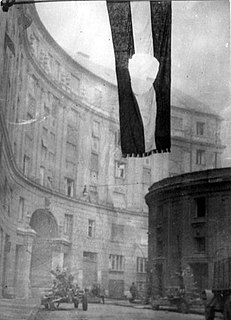
The Hungarian Revolution of 1956, was a countrywide revolution against the government of the Hungarian People's Republic (1949–1989) and the Hungarian domestic policies imposed by the USSR. Initially anarchic, during the Hungarian Uprising the Hungarian people culminated in protests against domestic policies imposed by the USSR, and the people formed together in protest against the Soviet Union.

Fidesz – Hungarian Civic Alliance is a right-wing populist and national-conservative political party in Hungary, led by Viktor Orbán.
The Hungary national football team represents Hungary in men's international football and is controlled by the Hungarian Football Federation. The team has made 9 appearances in the FIFA World Cup and 4 appearances in the European Championship, and plays its home matches at the Puskás Aréna, which opened in November 2019.
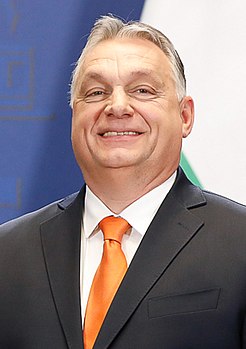
Viktor Mihály Orbán is a Hungarian politician who has served as prime minister of Hungary since 2010, previously holding the office from 1998 to 2002. He has presided over Fidesz, since 1993, with a brief break between 2000 and 2003. Orban's tenure has seen Hungary government shift towards what he has called "illiberal democracy" — citing countries such as China, Russia, India, Singapore, and Turkey as models of governance— while simultaneously promoting anti-Americanism, Euroscepticism, and opposition to Western democracy.
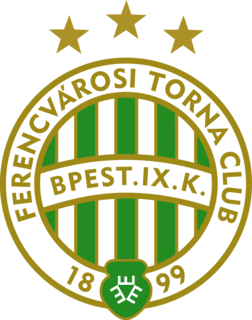
Ferencvárosi Torna Club, known as Ferencváros, Fradi, or simply FTC - Ferencvárosi Torna Club, is a professional football club based in Ferencváros, Budapest, Hungary, that competes in the Nemzeti Bajnokság I, the top flight of Hungarian football. Ferencváros was founded in 1899 by Ferenc Springer and a group of local residents of Budapest's ninth district, Ferencváros. Ferencváros is best known internationally for winning the 1964–65 edition of the Inter-Cities Fairs Cup after defeating Juventus 1–0 in Turin in the final. Ferencváros also reached the final in the same competition in 1968, when they lost to Leeds United, as well as the final in the 1974–75 season of the European Cup Winners' Cup, losing to Dynamo Kyiv.

The Kingdom of Hungary was a monarchy in Central Europe that existed for nearly a millennium, from the Middle Ages into the 20th century. The Principality of Hungary emerged as a Christian kingdom upon the coronation of the first king Stephen I at Esztergom around the year 1000; his family led the monarchy for 300 years. By the 12th century, the kingdom became a European middle power within the Western world.
Hungarian Recording Industry Association is the Hungarian music industry association, founded in 1992. MAHASZ issues the Hungarian Music Awards, awards music recording certification and maintains the music charts for Hungary.
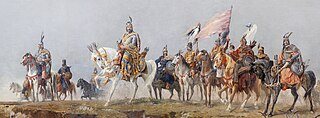
Hungarians, also known as Magyars, are a Finno-Ugric ethnic group. Native to Hungary and historical Hungarian lands who share a common culture, history, ancestry and language. The Hungarian language belongs to the Uralic language family. There are an estimated 17 million ethnic Hungarians and their descendants worldwide, of whom 9,3 million live in today's Hungary. About 7 million Hungarians live in areas that were part of the Kingdom of Hungary before the Treaty of Trianon in 1920 and are now parts of Hungary's seven neighbouring countries, Slovakia, Ukraine, Romania, Serbia, Croatia, Slovenia, and Austria. Significant groups of people with Hungarian ancestry live in various other parts of the world, most of them in the United States, Canada, Germany, France, the United Kingdom, Chile, Brazil, Australia and Argentina.
Historically, religion in Hungary has been dominated by forms of Christianity since the state's founding in the 11th century. Contemporary Hungary has no official religion. While the constitution "recognizes Christianity's nation-building role", freedom of religion in Hungary is declared a fundamental right.
The 2015–16 Nemzeti Bajnokság I, also known as NB I, is the 117th season of top-tier football in Hungary. The league is officially named OTP Bank Liga for sponsorship reasons. The season began 17 July 2015 and will conclude on 8 May 2016. Videoton are the defending champions having won their second Hungarian championship last season.

Paprika is a spice made from dried and ground red peppers. It is traditionally made from Capsicum annuum varietals in the Longum Group, which also includes chili peppers, but the peppers used for paprika tend to be milder and have thinner flesh. In some languages, but not English, the word paprika also refers to the plant and the fruit from which the spice is made, as well as to peppers in the Grossum Group.

The COVID-19 pandemic in Hungary is part of the ongoing worldwide pandemic of coronavirus disease 2019 caused by severe acute respiratory syndrome coronavirus 2. On 4 March 2020, the first cases in Hungary were announced. The first coronavirus-related death was announced on 15 March on the government's official website.



